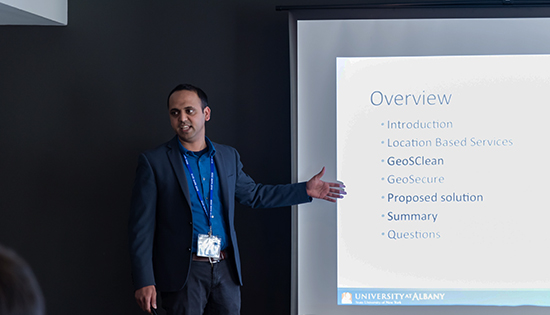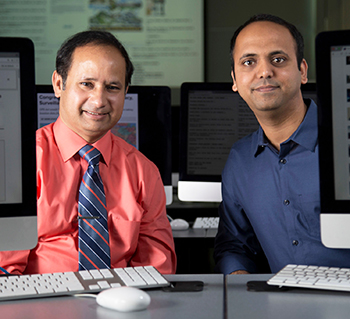A Safer Way to Share Your Location
 |
|
UAlbany systems developer analyst and doctoral student Vikram Patil presents his work at the IEEE 1st International Conference on Multimedia Information Processing and Retrieval.
|
ALBANY, N.Y. (July 25, 2018) -- From getting directions to searching for restaurants or tracking our fitness, our smartphone’s location-tracking abilities can be helpful for a number of everyday tasks. But is sharing your location putting your privacy at risk?
A new article by University at Albany researchers takes a close look at the risks associated using the cloud-based GPS enabled services or Location Based Services (LBS) on our devices.
Vikram Patil, a systems developer analyst with Information Technology Services (ITS) who is pursuing a doctorate from the College of Engineering and Applied Sciences, served as lead author on the study, which proposes a novel method to provide GPS-driven services but also keeps user location confidential. Patil conducted his research under the supervision of Associate Professor of Computer Science Pradeep Atrey, who serves as a coauthor of the study.
“Applications such as driverless or autonomous cars, cell phones, and Internet-of-Things (IoT) devices continuously send streams of the GPS trajectory data to the service provider for real-time analysis and Location Based Services,” said Patil. “However, numerous cyberattacks on the cloud raise serious security and privacy concerns among users, and as a result, many users do not like to share their location information. This poses a problem of availing LBS from the cloud without revealing users’ location.”
 |
|
Associate Professor of Computer Science Pradeep Atrey, left with Vikram Patil. (Photo by Patrick Dodson)
|
The challenge, according to Patil, is for service providers to present accurate location-based services, while shielding the location of the user.
In their paper, “GeoSClean: Secure Cleaning of GPS Trajectory Data using Anomaly Detection,” Patil and his colleagues discuss how smartphones transmit GPS data to providers, and how that data is interpreted to provide accurate location services or specifically requested data for the user (such as nearby restaurants or fitness tracking feedback).
“GPS receivers sometimes do not record signals transmitted by satellites accurately due to interference, low signal, sensor malfunction, etc. So the recorded GPS data point deviates from the actual location of the user,” said Patil.
This difference in actual and recorded GPS position may result in an error for LBS and affect the utility of these services. In many cases, this error is just a few meters but sometimes it can be huge. In order to eliminate it, LBS providers use a variety of techniques to pre-process, or "clean" the data, so that it could be more useful.
“In this paper, we propose a method, called GeoSClean, that not only cleans the GPS trajectory data using a novel anomaly detection scheme but also keeps users’ location confidential,” said Patil.
In their previous paper, GeoSecure: Towards Secure Outsourcing of GPS Data over Cloud, Patil and his colleagues discussed how to calculate approximate distance, velocity and acceleration without revealing user’s exact GPS coordinates which ensures privacy. When combined, these two projects provide a method for accurately calculating position while keeping location private. According to Patil and his colleagues, the experimental results of the proposed method are promising.
Patil’s coauthors include postdoctoral researcher Priyanka Singh, doctoral student and fellow ITS systems developer analyst Shivam Parikh, and Atrey. They recently presented their work at the IEEE 1st International Conference on Multimedia Information Processing and Retrieval.
The research holds promise, especially if it can both improve the accuracy of LBS for content service providers, while helping to shield users’ location and protect their privacy in the process.
![]() For more news, subscribe to UAlbany's RSS headline feeds
For more news, subscribe to UAlbany's RSS headline feeds
A comprehensive public research university, the University at Albany-SUNY offers more than 120 undergraduate majors and minors and 125 master's, doctoral and graduate certificate programs. UAlbany is a leader among all New York State colleges and universities in such diverse fields as atmospheric and environmental sciences, business, education, public health,health sciences, criminal justice, emergency preparedness, engineering and applied sciences, informatics, public administration, social welfare and sociology, taught by an extensive roster of faculty experts. It also offers expanded academic and research opportunities for students through an affiliation with Albany Law School. With a curriculum enhanced by 600 study-abroad opportunities, UAlbany launches great careers.


